Spanish News Today Editors Roundup Weekly Bulletin July 29
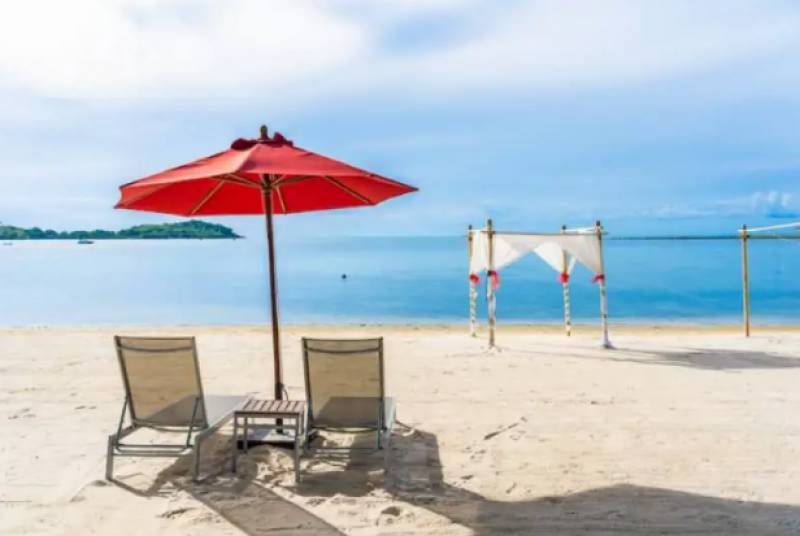
FEATURED ARTICLE: "Umbrella wars: fines of up to 3,000 euros for beach hoggers in Spain"
The week has been dominated by news (or lack thereof) of the fallout from last Sunday’s general election as the leaders of Spain’s two leading parties, the PSOE and PP, dig their heels in and refuse to concede defeat. But at a more local level, residents of the Region of Murcia are bracing themselves for yet another round of regional elections as the powers that be refuse to budge an inch.
Meanwhile, the whole world has been gripped by the devastating wildfires scorching across Europe and north Africa, many of which are still raging, that have claimed dozens of lives, destroyed homes and ruined valuable farmlandS. Here in Spain, the persistently hot weather has focused most of the carnage on Gran Canaria, but a few cool days mid-week have thankfully quenched most of the flames.
And while it might not seem like the most critical of topics, Spain’s lovely beaches have been making the headlines both at home and abroad for all the wrong reasons. The so-called ‘umbrella wars’ have been waging up and down the coast, with bleary-eyed tourists furious to find every square inch of prime sand taken up by empty deck chairs and abandoned umbrellas.
Yep, between politics and petty trifles, it’s all happening in Spain this week, so grab a cool drink and read on to find out more.
Umbrella wars
Let me paint a picture for you. After a baking hot summer day on the Costa del Sol, Costa Calida, Costa Blanca (your choice here), the sun is setting over the faded-Levi blue sky far off in the horizon. A faint breeze it rising off the ocean and it feels like just the right time to take a secluded walk along a now empty beach.
Except that it’s not empty at all. Instead, the water’s edge is crammed full of people setting up deck chairs, umbrellas and portable tables, ready for them to plonk their bums first thing in the morning – or early afternoon, if they fancy a lie-in.
Here’s the issue: people nabbing the best spot on the beach the night before, or at the crack of dawn, only to abandon their belongings for hours on end so that genuine sunbathers can’t grab a patch of sand.
It’s not a laughing matter though, as in towns where reserving a spot on the sand is banned, fines for breaking the rules can be as high as 3,000 euros.
Benidorm has definitely been getting the most flack and while authorities insist they will fine repeat offenders, the City Council was quick to point out that most people tend to drop their things at the beach and head off for a stroll along the water’s edge.
This, of course, is allowed, according to councillor Monica Gomez, but she stressed that putting belongings out early in the morning and leaving the beach is expressly prohibited.
“By-laws mean the local police have the power to act when items are left on the beach in this way and it leads to conflict between beachgoers and they always act when required to in order to mediate and try to resolve disputes to make sure both parties can enjoy a good day out on the sand,” Ms Gomez said.
“However if people persist in this sort of behaviour where they abandon sunbeds and umbrellas and generate conflict with other beach users, the police can sanction them for a reiteration of a practice that is not permitted,” she added.
Spanish election results are in but future government is undecided
It was to be a decisive day at the ballots for Spaniards last Sunday, when voters would decide whether they wanted to oust Pedro Sánchez in the first general election to be held since 2019, or whether they would deny pretender to the throne Alberto Núñez Feijóo his day in the sun. Well,
as it turned out, things weren’t quite as decisive as that.
Yes, Feijóo and his PP party won the most votes and the most seats in parliament, and gained a whopping 47 seats more than they did in 2019. But they also did not win enough seats to reach the required majority of 176 seats that would allow them to form a government.
But Sánchez’s PSOE Socialists also got more seats than they did in 2019 and in the end it was a pretty close-run thing between Spain’s two main parties, leaving neither with a clear mandate to lead.
What’s more, even by forming a coalition with their respective third- and fourth-place parties on the extreme right and left, neither the PP nor the PSOE can reach an absolute majority. They will need to form coalitions with even smaller local parties that only attained a handful of votes each.
For those on the right, this is not as easy as it seemed as they find VOX’s form of firebrand, chest-beating nationalism distasteful and would be unwilling to support a government in which VOX is the largest minority partner. For the left, the party which has the deciding vote on whether a left-wing government will be formed is the problematic Catalan independence party Junts of exiled insurrectionist Carles Puigdemont, who you may remember tried to get Catalonia to secede from Spain in 2014 in an illegal referendum.
What we’ll have now is a possibly extended period of negotiation in which the parties will hold private talks in shady, smoky backrooms to decide the fate of the future government that won’t be exactly what anyone really voted for.
Coalitions governments like these have long been popular and common in other European democracies, notably in Germany, where parties are forced to concede, compromise and collaborate in order to pass laws that satisfy a middle ground, rather than rolling roughshod over regulations for four years without anyone to hold them back.
It seems that, despite these election results seeming to show that Spanish voters are drifting back to the middle ground of the PP and PSOE once again, coalition governments are here to stay in Spain, although of what stripe remains to be seen.
Then again, there now exists the not insignificant possibility that no formulation of coalition can reach an absolute majority as there will be more elections called for December this year. Hold on to your hats because this is hardly the end of this political tale…
It might not seem likely, but political fur is being even more ruffled at the local level. Way back in May, towns and cities voted for their new regional and municipal governments and in the Region of Murcia, it was a landslide for the long-standing PP. Current president Fernando López Miras naturally thought his investiture was a shoo-in, but he didn’t count on the dogged determination of VOX.
But unless a new president is declared by September 7, the current regional government will be dissolved and the battle-weary people of Murcia will be expected to traipse back to the polls to vote again.
Mediterranean on fire
The warming of our planet, professor of fire science at Imperial College London Guillermo Rein, explained, is making the wildfires “larger, faster and harder to stop.”

“The intense heat of the summer dries vegetation and makes it very flammable, easier to catch fire."
Ten other countries, including Greece, Italy, Croatia, France, Portugal, Algeria, and Tunisia are all fighting against this unstoppable enemy as climate change bares its claws and shows exactly the destruction and long-term scarring it can cause.
Nations are banding together under this terrifying catastrophe and aid is being offered far and wide to the worst affected countries. This week, the EU agreed to send firefighting planes from Spain to help tackle the flames in Tunisia, where the wildfire spread across the border from neighbouring Algeria.
Flying high
So, it might not be the best time to plan a vacation, but there’s no denying that even with everything going on most people from cooler climes are still dreaming about sun-drenched holidays, if not for this year, then next. Well, if that sounds like you then fair warning, start saving now, because flights to and from Spain are about to get a whole lot more expensive come 2024.
Unsurprisingly, the airlines are dead against the move, instead arguing that rates should be reduced for the very same reasons.
The inescapable fact, though, is that the days off 99-cent flights are long behind us, but this doesn’t seem to have stopped people booking trips to the Spanish Costas. As a matter of fact,
last month was the busiest June ever in the Region of Murcia in terms of both the number of travellers visiting the area and the amount of overnight stays. This is according to the Hotel Occupancy Survey of the National Statistics Institute (INE), which revealed that hotels on the Costa Cálida welcomed 70,187 guests during the month, surpassing the 2019 record by 2.3%.
The court judged the article to be null and void because it limits the fundamental right of free movement of foreign citizens with temporary residence in Spain.
Employers have already offered a 20 euro wage increase, which would bring salaries up to around 1103 euros per month, but the COOO Habitat Balearas union has roundly rejected this and the strike is set to begin at 7am on Tuesday August 1 unless a last-ditch agreement can be reached.
Murcia
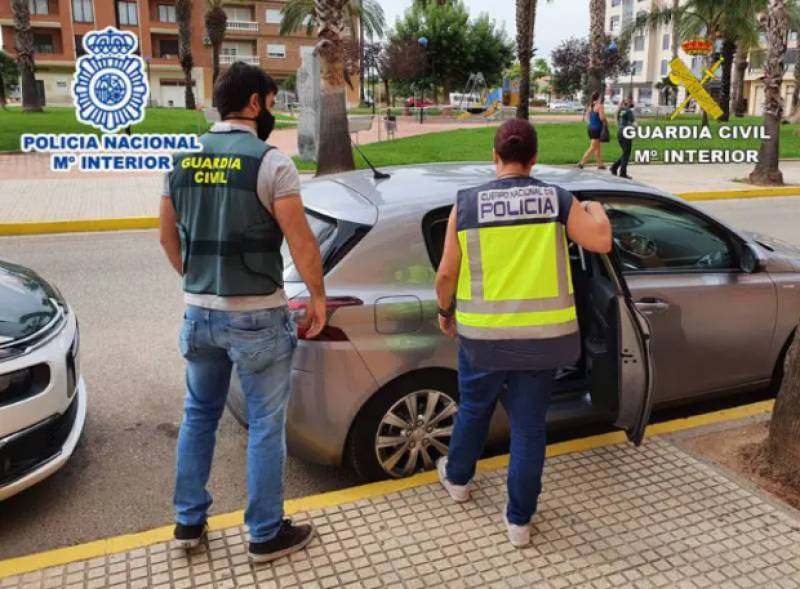
It’s been quite a week for Spanish police, who have taken dozens of dangerous criminals of the streets, many of whom were wanted internationally. Case in point: three French, Moroccan and Angolan citizens wanted for kidnapping a man in France were apprehended in the last few days in the Region’s capital.
French authorities issued a European arrest and surrender warrant (OEDE) for the three individuals after they became the prime suspects in a drug-related kidnapping in the city of Toulouse.
Police believe the men illegally detained another person who had stolen narcotics from them and intended to demand a ransom for his safe release.
This gruesome story begins with a disgruntled ex who drove to his former partner’s apartment block in Malva-rosa avenue in Valencia. What he didn’t realise was that the object of his affections had since moved away and, annoyed that she wouldn’t answer the door bell, the suspect set fire to several pieces of furniture lying in the hallway.
Naturally, these quickly caught fire and the dense plume of smoke travelled upstairs, where a woman was living with her three small children. Desperate to escape, she and her children, aged three, seven and nine, tried to flee from the building but were unable to get past the fourth floor where the fire had taken hold.
The youngest boy died of suffocation due to smoke inhalation, while his mother and two brothers also suffered multiple burns.
The magistrate for the case decided against a life sentence on this occasion since the death was not intentional. However, the 22 years can still be appealed against before the Civil and Criminal Chamber of the Superior Court of Justice of the Valencian Community.
The work will take three days and will be carried out at night to avoid the high daytime temperatures and inconvenience to local businesses.
The awnings come in many different sizes to adapt to the streets and buildings, but all are connected with 6mm steel cables and 40mm carabiners at the vertices to guarantee that they are secure. Once the canvasses are in place they are stretched tight to avoid any creases or droops.
It’s been three years since the Law for the Recovery and Protection of the Mar Menor came into force and one of its primary focuses was on responsible farming in the area. While everyone agrees the fragile lagoon must be protected, the legislation isn’t without its detractors, and farmers have long argued that some of the rules make it next to impossible to work in the Campo de Cartagena.
Sanctions have been imposed on farmers from all municipalities whose properties border the Mar Menor. Some of the minor violations involve failing to build plant barriers to prevent run-off flowing into the lagoon and problems with record keeping and registration.
On a more serious level, six farmers have been fined for the poor upkeep of their slurry pits, exceeding the maximum limit on the amount of inorganic fertilisers used and cultivating crops less than 500 metres from the Mar Menor.
Check out our EVENTS DIARY for events and activities coming up in the Region of Murcia:
Spain
Watermelon is surely one of the most popular fruits during the summer months and no trip to the beach or poolside is complete without a juicy, refreshing wedge. But spring storms and scorching summer heat mean that supplies in Spain are running low, so grocery chains have turned to other markets, such as Morocco, to bump up their stock.
These Moroccan watermelons reportedly contained traces of an insecticide in proportions that exceed the limits established in Europe.
A spokesperson from the alert system has described this as a “serious” incident, since the pesticide contains a chemical substance called methomyl, which, when consumed, can result in symptoms such as headache, dizziness, nausea, vomiting, excessive sweating, tremors, muscle weakness and blurred vision.
Furthermore, "the mixture of methomyl with alcohol consumption can impact the central and peripheral nervous system, as well as causing kidney failure."
The main worry is that authorities are unsure how far and wide the contaminated fruit has been distributed in Spain, so the advice is to avoid any watermelon from Morocco.
According to reports, an argument broke out between a doorman and a French tourist and the holidaymaker was turfed out of the nightclub. Once outside, the bouncer punched the man hard enough to knock him unconscious. Shockingly, he then continued to kick the tourist in the head several times while he was on the ground.
A friend of the victim tried to intervene and he too was punched in the face by the doorman, while a third French man was also assaulted and thrown out of the nightclub by another bouncer.
After an investigation, the Guardia Civil of Calviá arrested the two bouncers, one Brazilian and the other Senegalese. They were originally charged with assault but this has been upgraded to attempted murder given the ferocity of the assault and the extent of the injuries sustained by the victims.
Somehow the child’s parents managed to take their eyes of her for a split second and she fell into the pool. Her sister alerted the family that the toddler was drowning.
An ambulance from the Emergency Medical Services (SEM) sped to the scene and spent some time trying to resuscitate the little girl, but sadly she was pronounced dead by the medics.
Alicante
People of Orihuela Costa, rejoice! After seven long months, the council has finally installed toilets on the area’s 11 neglected beaches, which have been without any facilities whatsoever all year. The newly-appointed council began installing the bathrooms on Friday July 21 and they’ll remain in place until September 15. Beachgoers can access them between the hours of 10am and 8pm.
However, holidaymakers will have to go without a tipple at the beach bars since, due to a delay in the renewal of their licences, the doors to the chiringuitos have remained firmly shut all year. Beachgoers are also unable to rent sun loungers or umbrellas, and there are no water activities available.
The sticky issue of the beach bars has become the first major headache of the new PP-VOX government team in Orihuela, but it’s unlikely to be resolved before the end of the summer.
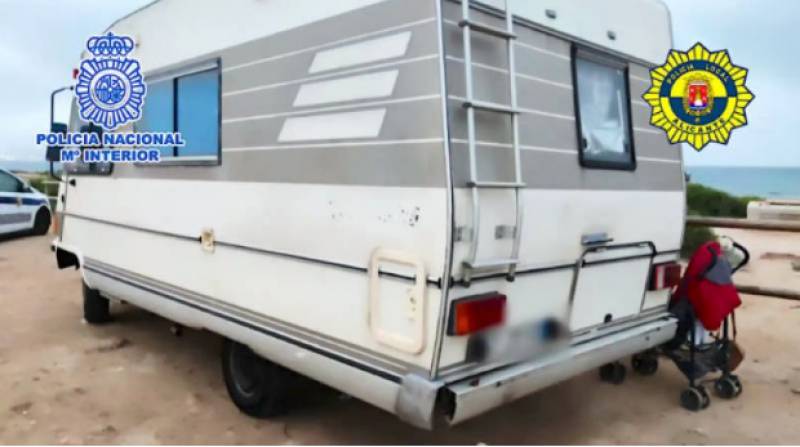
They say crime never takes a day off but two hapless thieves in Alicante don’t seem to have received this memo as they were caught red-handed leisurely cruising along the coast in stolen vehicles.
Police were first alerted about the pair when one of them, driving a car, was involved in a road traffic accident and fled the scene. Officers tracked the vehicle to a beach-side car park and arrested the hit-and-run driver on the spot. It didn’t take long for police to run the number plates and figure out that the car had been reported stolen in Italy.
Once in custody, the man confessed that he was working with an accomplice, who was at that moment enjoying the Alicante coast in a robbed campervan.
Further digging revealed that the registration plates of the motor home belonged to another Italian car whose plates had been robbed in France.
It was obvious that the locks on both vehicles had been tampered with, as had the chassis number of the second car.
Officers wasted no time in locking up the pair, who turned out to be from Croatia and aged 20 and 47.
Tragedy struck the Costa Blanca this week when a drunk British woman ploughed through the front window of a petrol station and ran over two customers, before crashing out through the back wall in her Mercedes. An 81-year-old man was killed and a 51-year-old woman was hospitalised with serious injuries.
The horrific accident happened in the municipality of Poble Nou de Benitatxell at a BP service station with attached mini-supermarket right in front of the CV-740. Witnesses said the driver, who later failed a breathalyser, careened off the main road onto the service station forecourt “at speed” before smashing through the front of the building.
Check out the Costa Blanca What’s On and Where to Go Facebook group to see more things to do around Alicante province!
Andalucía
Two European arrest warrants were issued for the man and investigators in Spain first tracked him to Burguillos, where locals reported he lived life “normally”, going “totally unnoticed”.
The criminal network to which he belongs reportedly made 70,00 euros in just four months. Although the suspect had no arrests in Spain, he has “an extensive criminal record” in France and Germany.
According to witnesses, the victim failed to pull up the handbrake and was trapped against a barrier by the moving vehicle. However, a National Police investigation has been opened to determine to exact cause of the tragedy.
Staff from the Hotel Amaragua, right across the street, watched the entire scene unfold and rushed over to comfort the family.
"The ambulance arrived, but we couldn't do anything," the hotel manager said. The tourist was pronounced dead at the scene.

You may have missed…
- July 2023 goes down in history as the hottest month ever recorded.
It’s not quite over yet, but this July is on the fast track to becoming the warmest month ever recorded on the planet.
- 74-year-old swimmer dies on Los Alcazares beach.
A 74-year-old man died on Tuesday July 25 in Los Alcázares. Lifeguards patrolling Los Narajos beach noticed the unconscious victim floating in the water at 12:43pm and immediately sprung into action, dragging him onto the sand.
- Disgruntled passengers slam inadequate Cadiz Cercanias train facilities.
Rail passengers in Spain’s southern province of Cadiz have complained of inadequate services and facilities on the Cercanías light overground trains run by state operator Renfe.
- Portugal imposes restrictions on travel from Spain for Papal visit.
Pope Francis is scheduled to visit Portugal between August 2 and 6 to attend the World Youth Day events in Lisbon. As a result, security will be stepped up on all border points with Spain and anyone wishing to cross over will have to present a valid identity document, both adults and children.
- Pay and display parking tickets scrapped in Cartagena.
Advances in parking meter technology have made it possible for the Town Hall to approve a modification of its local “ORA” parking rules, eliminating the need to display tickets on the dashboard of parked vehicles.
So that’s it for another week! Have a nice weekend and see you next Friday.
’Til then!
article_detail

|



 “The intense heat of the summer dries vegetation and makes it very flammable, easier to catch fire."
“The intense heat of the summer dries vegetation and makes it very flammable, easier to catch fire."
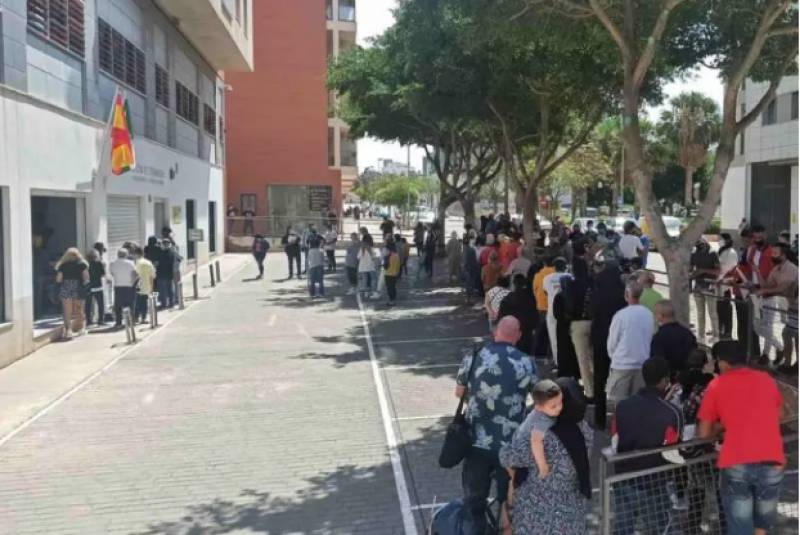 There’s also some pretty good news for people living permanently in Spain, since the Supreme Court has axed a clause of the Spanish Immigration Regulations that allowed the authorities to withdraw temporary residency from people who were absent from the country for six months of the year.
There’s also some pretty good news for people living permanently in Spain, since the Supreme Court has axed a clause of the Spanish Immigration Regulations that allowed the authorities to withdraw temporary residency from people who were absent from the country for six months of the year.
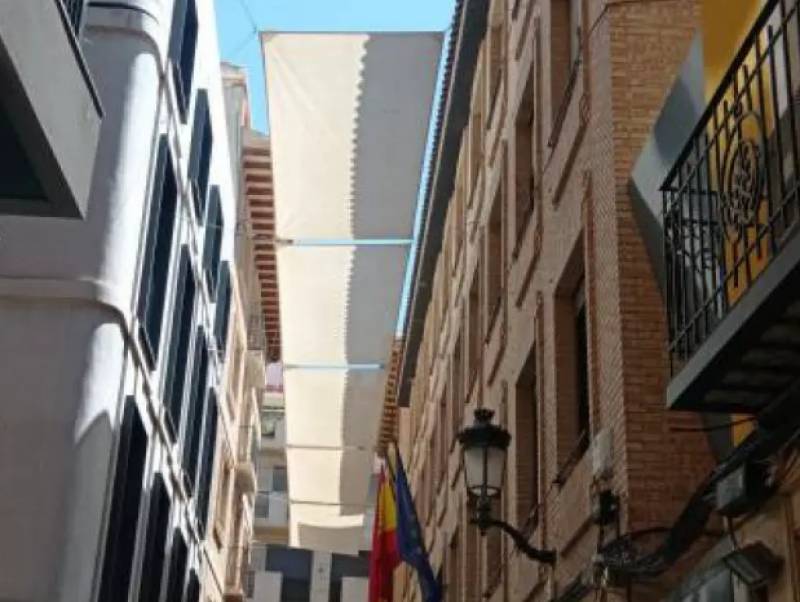 On to more pleasant things now and the newly elected council in Murcia city has decided to give residents a breather with the installation of 73 awnings that are designed to stretch across entire streets, between buildings, to provide shoppers and workers with as much shade as possible.
On to more pleasant things now and the newly elected council in Murcia city has decided to give residents a breather with the installation of 73 awnings that are designed to stretch across entire streets, between buildings, to provide shoppers and workers with as much shade as possible.
 Sadly the grim news continues with the death of a toddler in a private pool in l’Ametlla de Mar, close to Barcelona. The two-year-old girl was was holidaying in Spain with her parents and siblings and police officials have confirmed that the family is of German and Russian origin.
Sadly the grim news continues with the death of a toddler in a private pool in l’Ametlla de Mar, close to Barcelona. The two-year-old girl was was holidaying in Spain with her parents and siblings and police officials have confirmed that the family is of German and Russian origin.



























